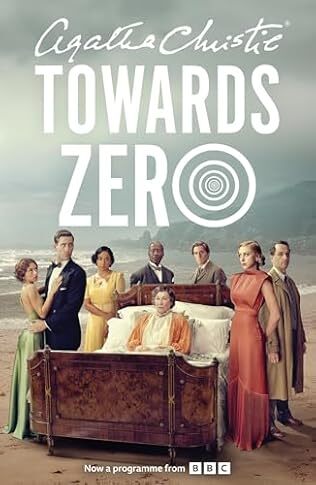Towards Zero

A review of Towards Zero by Agatha Christie – 250316
The fifth and final novel in Christie’s Superintendent Battle series, originally published in 1944, has an almost Sophoclean and philosophical feel about it. The central premise, as enunciated by Mr Treves, an elderly lawyer with a dicky heart, is that many detective stories start at the wrong point, murder being the end point rather than the beginning, with “all the causes and events that bring certain people to a certain place at a certain time on a certain day”.
The nexus of this chain of events is Lady Tressilian’s house in Saltcreek in Cornwall, where a group of people assemble to take the air and to work out their complex relationships. Curiously, Neville Strange, a professional tennis player, has chosen to bring his relatively new wife, the rather selfish and jealous Kay, to spend a couple of weeks in the company of his former wife, Audrey, whom he had abandoned and divorced. Naturally it makes for an uncomfortable time with the former couple still manifesting feelings for each other.
There is a brooding atmosphere about the place which Christie stokes up with aplomb. The reader is left anticipating some kind of explosion of emotions as zero hour approaches but she cleverly delays it to almost the midway point when it comes as rather a damp squib. Poor old Mr Treves dies from heart failure having had to walk up three flights of stairs to get to his rooms as the lift has a notice saying that it is out of order. The hotel deny that there was any fault with the machinery.
Any sense of disappointment over the way Treves met his maker is more than made up for by the brutality of Lady Tressilian’s death, brutally hit over the head with a golf club that is done in a way to suggest that the assailant is left-handed. There is more than enough evidence, carelessly discarded about the place, to incriminate either of Neville or Audrey Strange but why would they be so careless over covering their tracks and what was their motive? Neville is right-handed and does not overly need Lady T’s money whereas Audrey, who inherits half the estate, has motive enough and is left-handed. Although the evidence points a certain way, Battle, an industrious if somewhat unimaginative detective, believes there is more to it than meets the eye.
And indeed there is. It is a case of bluff and double bluff marinated in a sauce of long-awaited revenge where scores from long ago are to be settled and the victim of the plot is to suffer a long and torturous death at the hangman’s noose. It is another case where a physical peculiarity proves crucial and Mr Treves’ fate is sealed because of his boast that he can tell the identity of someone involved in a tragic and fatal childhood accident by the mark. Once more too much information is dangerous. Lady T, though, is a sacrificial victim to further the overall plan.
The character of Angus MacWhirter, who appears at the beginning and towards the end of the story, brings another dimension to the story, a discussion of suicide. Angus had tried and failed to commit suicide and while recuperating is told by a nurse that he would never attempt it again but also would bring enormous help to someone simply by being at a certain place at a certain time, another manifestation of the zero factor.
Of course, Angus finds himself down at Stark Head, where he had attempted suicide, and is there in time to stop Audrey from throwing herself off the cliff. He then provides some vital “evidence” which allows Battle to force a confession from the culprit. The denouement also raises a moral dilemma over how sacrosanct truth really is. Is it acceptable to have a bit of leeway if it results in the right outcome?
Christie novels can be a bit superficial and stereotyped, but I found that this was a deeper and more profound novel, exploring feelings and topics which really meant something to the author.
As for the recent TV adaptation, how can you have a Battle story without Battle and the conflation of Battle and MacWhirter into one made a nonsense of the pivotal role of the latter. Stick to the book!



